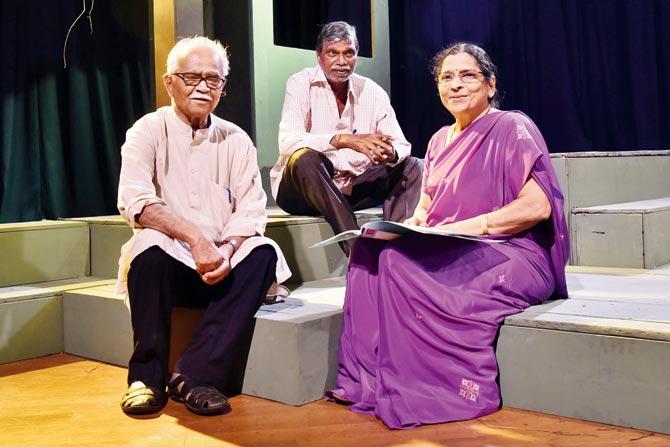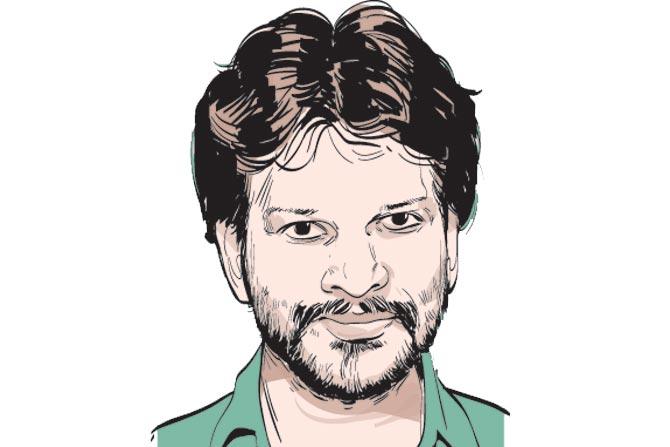Awishkar Theatre, a ground-breaking group since inception, presents the new play Aranya Kiran, which puts Lord Krishna in a spot. It is a tribute to late director Chetan Datar, who staged bold narratives in alternative spaces

In Aranya Kiran, Lord Krishna is a 70-year-old repentant frail human, put on a spot by his friends and family. The scene above depicts foster parents Nand (Nandu Sawant) and Yashoda (Trupti Jadhav), who look back at life in the context of Krishnas tricker
 We are all children lost in a forest; petrified by sounds, echoes, silhouettes, and outlines; we continue to live because we love." The resounding line from the Marathi play Aranya Kiran A ray of light in a forest suits the current nomadic condition of the 47-year-old Awishkar Theatre, which does not have a rightful rehearsal and performance space in Mumbai.
We are all children lost in a forest; petrified by sounds, echoes, silhouettes, and outlines; we continue to live because we love." The resounding line from the Marathi play Aranya Kiran A ray of light in a forest suits the current nomadic condition of the 47-year-old Awishkar Theatre, which does not have a rightful rehearsal and performance space in Mumbai.
Awishkar-s lack of permanent space has been an issue for a while. At this point, the group operates from a borrowed auditorium Mini Theatre of the PL Deshpande Maharashtra Kala Academy where they presented their 175th production Aranya Kiran on August 2. One of its founders, 87-year-old Arun Kakade, calls Awishkar a "group of theatre-crazy wanderers," for whom the opening show, involving 20-odd artistes on and off stage, was crucial, not just because its shows will speak of the group-s staying power, but because it is a tribute to their late director-playwright Chetan Datar who passed away at an untimely age of 44 in August, 10 years ago.
ADVERTISEMENT

The play is being directed by Ajit Bhagat and has been translated from Hindi to Marathi by Dr Vasudha Sahasrabudhe
Datar, under the aegis of Awishkar, staged and adapted numerous unconventional narratives ranging from Miro Gavran-s Death Of An Actor to Rabindranath Tagore-s Giribala. His cross-gendered twist to Shakespeare-s A Midsummer Night-s Dream was super-entertaining, animated with a hilarity with which he handled risqué jokes. He did justice to the dark theme in Children of Hiroshima in a powerful dramatisation of the testimonies of Hiroshima survivors; he introduced Mumbai audiences to the tabooed homosexuality in Ek, Madhav Baug.
Aranya Kiran directed by Ajit Bhagat is the sort of off-the-wall, irreverent and gutsy piece of theatre that befits Datar-s exploratory spirit. In actress Nandita Patkar-s the one who plays Gandhari and worked with Datar in plays like Iraq, Radha Vaza Ranade, Jungle Mein Mangal words, "Chetan was averse to lavish sets, famed performers and other paraphernalia, which he thought did not necessarily bring out the drama within. Aranya Kiran is his kind of stuff." The play belongs to that portion of the epic Mahabharata, which is not usually chosen for the entertainment-seeking theatre-goer — a self-questioning Lord Krishna played by Sushil Inamdar in Dwarka, no longer at the heroic Kurukshetra battlefield. It is a string of monologues in which various lead characters — wife Rukmini, brother Balaram, foster parents Nand and Yashoda and lastly mother-like Gandhari — interrogate Krishna-s trickery, political moves and world view.

Arun Kakade, 87, is one of the few remaining founding members of Awishkar.
Aranya Kiran-s Krishna is no sprightly makhan chor or handsome lover surrounded by gopis, but a 70-year-old weak man who is ultimately hit by a hunter-s arrow; mortal and fallible, he is open to admitting mistakes and has no flattering view of his past. He is, in fact, too honest for a viewer who has eulogised and revered the supreme deity Lord Krishna. Little wonder that after late Vasant Deo wrote Aranya Kiran in Hindi in 1985, it has been rarely brought on stage, not to forget its first rendering by Satyadev Dubey-s Theatre Unit. As Awishkar-s core team zeroed in on it, they approached renowned bilingual translator Dr Vasudha Sahasrabudhe for a Marathi version, who not only finished the task in two months, but was also present for the rehearsals. "Aranya Kiran rests on word play and logical arguments; it-s an oblique look at Krishna-s karmayog, the kind of a play where a pause can change the meaning of words," she adds.
Aranya Kiran raises pertinent issues about human life and its possibilities. Awishkar-s Arun Kakade is also struggling with his set of questions. Having lost six colleagues in a short span of 10 years Datar, director Jaydev Hattangadi, playwright Vijay Tendulkar, director Dubey, founder-actress Sulabha Deshpande, actor Hemu Adhikari, he stands alone arguing a case before the municipal corporation in a space-starved city where theatre does not hold high stakes. Kakade is armed not that it is helping his cause with years of physical correspondence with past municipal commissioners who-d agreed to support Awishkar-s creative inputs in keeping experimental multi-lingual theatre alive in the city. At this point, a portion of the hall of the New Mahim Municipal High School Miya Mohmd. Chhotani Marg houses Awishkar-s documentation of scripts, workshops, festivals, three huge closets containing sets and property, around 50 trunks of costumes and gears, which once defined Mumbai-s theatre consciousness. The main hall where the group staged multiple scripts 1992-2016 is locked, following an order of the corporation, which doesn-t allow any -other activity- in school premises. As Kakade observes: "Doing experimental theatre in Mumbai was never easy. And whether we have a space or not, our show will be on."
This is the second time the group has been asked to move out, the first was the dislodgment from Dadar-s Chhabildas High School where they had been allowed to use the second floor hall since 1974 at a nominal rent, which came from the gate money for every performance. Chhabildas was not just a Dadar address, but the genesis of a forward-thinking progressive group, which mounted ground-breaking plays like Changuna, Gaurai, Pahije Jatiche, Bhint, Medea and Arya Chanakya. It was an adda for several Pune, Aurangabad, Satara groups, which presented scintillating pieces in that phase.
Awishkar-s founders Tendulkar, Arvind and Sulabha Deshpande, Madhav Sakhardande, Kakade convinced the Chhabildas management to make room for theatre enthusiasts of all hues. The chemistry between the school trustees also the fact that Sulabha Deshpande was a teacher at the school and Awishkar became the catalyst for experimental work. It gave birth to Chandrashala, the children-s wing the launching pad for generations of child actors, which produced the iconic children-s play Durga Zhali Gauri — a play inculcating hard work as a core human value. Awishkar-s tryst with Chhabildas ended in 1992, which not just put an end to performances, but sealed a theatre laboratory abuzz with awesome experiments.
Aranya Kiran is as much a tribute to Awishkar-s journey, as it is a commemoration of a playwright capable of producing robust thought-provoking works, which can electrify performers over generations.
Playwright Deo 1929-1996, was a Hindi academic-poet who taught at Mumbai-s Sathaye College whose dialogues Ardh Satya, Party, Kamla sharpened India-s parallel cinema voice. He was most feted for the lyrics Saanjh Dhale Gagan Tale and Mann Kyun Behka of the film Utsav; but his real contribution lies in rendering Vijay Tendulkar for the Hindi-speaking world. His play Aranya Kiran adds a dimension to Indian theatre by questioning gendered identities and the idea of the macho man, chiefly in characters of Krishna-s brother Balaram and son Samba. In today-s times when male courage and bravery are being debated in the public sphere, Aranya Kiran is a perfect ray of light.
Sumedha Raikar-Mhatre is a culture columnist in search of the sub-text. You can reach her on sumedha.raikar@gmail.com
Catch up on all the latest Mumbai news, crime news, current affairs, and also a complete guide on Mumbai from food to things to do and events across the city here. Also download the new mid-day Android and iOS apps to get latest updates
 Subscribe today by clicking the link and stay updated with the latest news!" Click here!
Subscribe today by clicking the link and stay updated with the latest news!" Click here!







